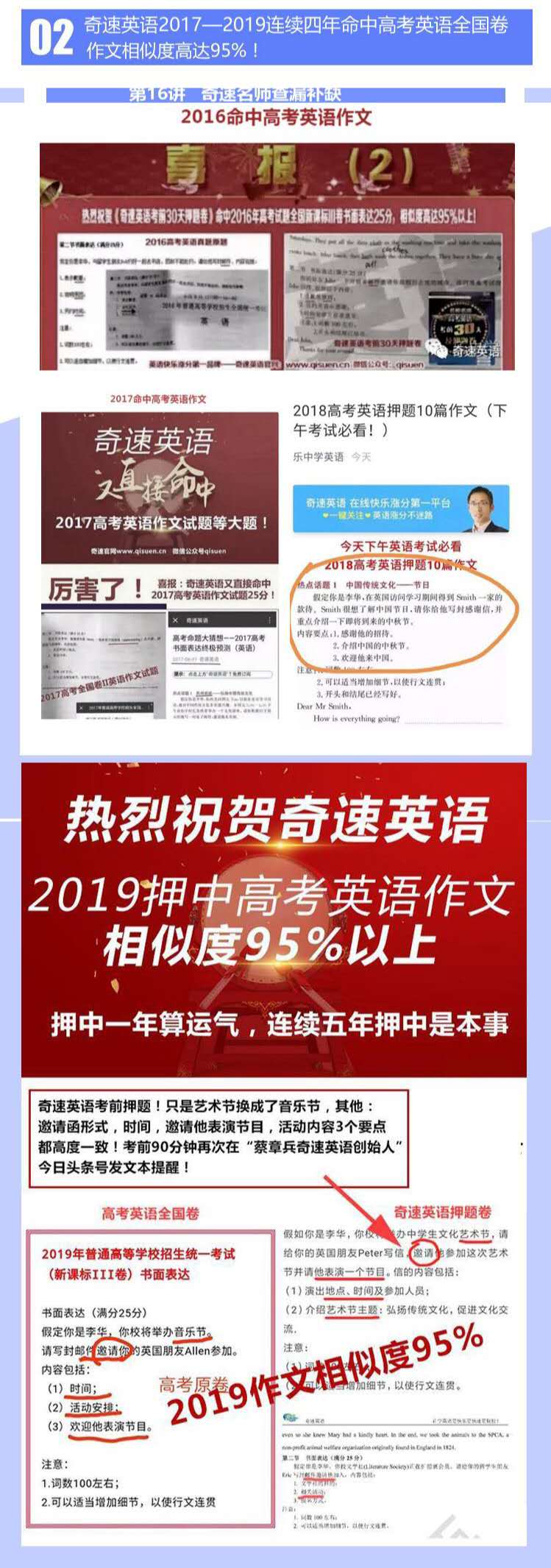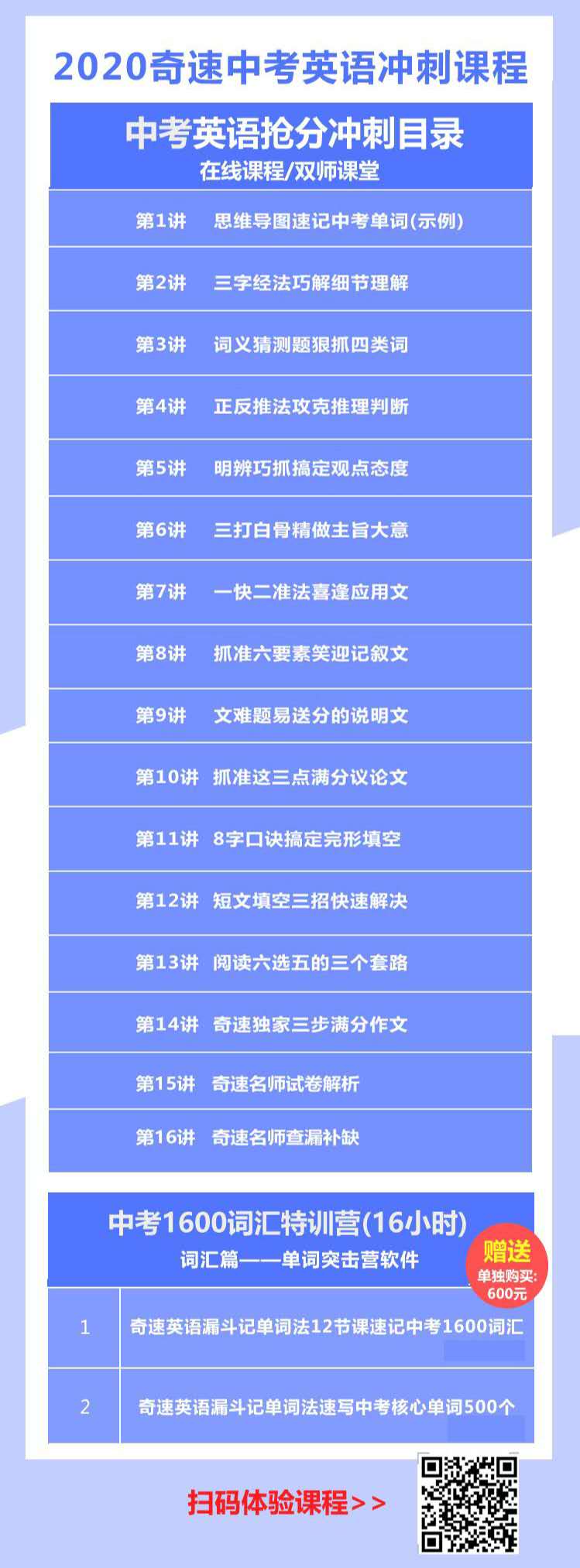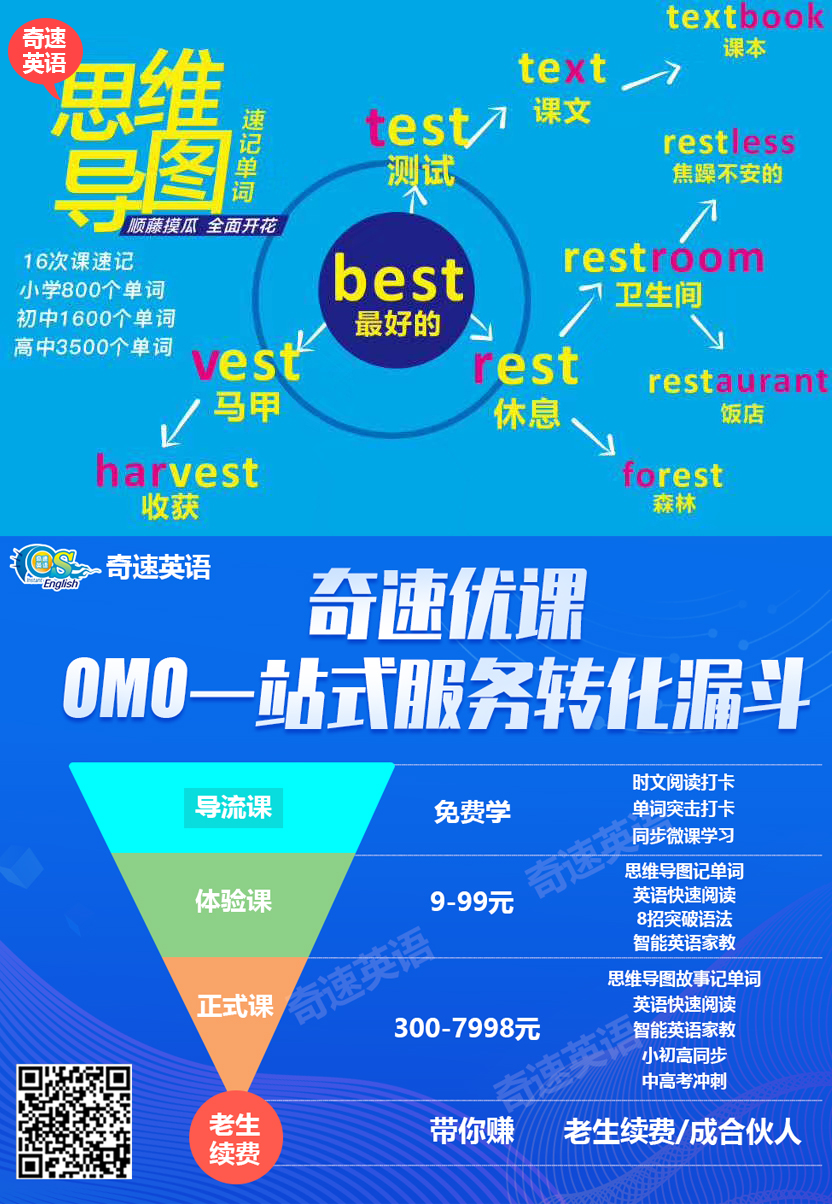中考试题考查词语辨析主要是每组词或短语之间的细小差别,是为了检测同学们辨别词形和运用词汇的能力。今天这20组词的用法,尤其是初三的同学一定要辨析清楚,2020中考很可能会考哦!
小简老师已为大家备好电子打印版,文末附电子打印版免费领取方式,想要获取电子打印版请拉到文末。
after 以过去为起点,表示过去一段时间之后,常用于过去时态的句子中。例如:
She went after three days.
in 以现在为起点,表将来一段时间以后,常用于将来时态的句子中。例如:
She will go in three days.
2. how long, how often, how soon
how long指多长时间,主要用来对一段时间(如three days, four weeks 等)提问。
how often指多久一次,主要用来对频度状语(如once a week等)提问。
例如:—How often does he come here? 他多久来一次?
how soon指多久以后,主要用来对表示将来的一段时间(in an hour, in two weeks 等)提问。
例如:How soon can you come?
3. few, a few, little, a little
few 和little的意思是否定的,表示“很少”或“几乎没有”;而a few和a little的意思是肯定的,表示“有一些,有一点儿”。
few 和 a few修饰可数名词;little 和 a little 修饰不可数名词。
the other 指两者中的“另一个”,表示特指。例如:
We stood on one side of the road and they stood on the other.
another表示泛指,用来指至少三者中的另一个。
例如:She has taken another of my books.
5. spend, take, cost, pay
spend的宾语是时间或金钱,句子的主语必须是人。例如:
She spent the whole evening in reading.
take用来指“花费”时间,句子的主语通常是表示事物的词语。例如:
How long will this job take you?
cost 指花费时间、金钱或力气等,只能用表示事物的词做主语。例如:
How much does the jacket cost?
pay 主要指主语(某人)买某物(或为某事)付多少钱(给某人)。例如:
I pay for my rooms by month.
6. speak, say, talk, tell
speak的意思是“讲话;演讲”,着重指说话的动作,多用作不及物动词;用作及物动词时,其宾语是语言。例如:
say的意思是“说;讲”,一般用作及物动词,着重指说话的内容。它的宾语可以是名词、代词或直接引语等。例如:
She says, “Don’t draw on the wall!”
talk的意思是“说;讲;谈话”,与speak意义比较接近,但不如speak正式,着重强调两人之间的相互谈话,也可指单方面的谈话。例如:
She is talking with John in English.
tell意为“告诉;讲述;吩咐”,多指以口头方式将某事告诉某人,常接双宾语。例如:
She is telling the children a story.
between 的意思是“在……中间,在……之间”,一般指在两者之间。例如:
There is a table between two windows.
between 有时也表示在多于两个以上的事物之间,但那也是指在每二者之间。例如:
the relationship between different provinces and municiplities
省市和省市之间的关系(这里是指每两个省市之间的相互关系)
among 的意思是“在……中间,在……之中”,一般指在三个或三个以上的同类事物之中。例如:
The teacher distributed them among the students.
这两个词都有“获胜,打败”的意思,但其后宾语不同。
beat是“打败,优于”的意思,后面接人或队。例如:
We won the match/game/race/the first place.
9. agree with, agree on, agree to
agree on表示“就……取得一致意见”。例如:
We all agree on (making) an early start.
agree with表示“与……意见一致”,后面既可以跟表示人的名词或人称代词,也可以跟表示意见或看法的名词或what引导的从句。例如:
I agree with you without reservation.
We agree with what you said just now.
agree to表示“赞同、同意、答应或接受”,后面不能接人,只能接“提议,计划,方案”等。例如:
I agree to the terms proposed.
10. bring, take, carry,fetch
这四个词都是动词,都含有“带”或“拿”的意思,但使用的场合各不相同。
Next time don’t forget to bring me a copy of your work.
take是bring的对语,作“带去,拿去”解。例如:
Take the box away, please.
carry表示“运载,携带”之意,运送的方式很多,可以用车、船,也可以用手甚至用头。例如:
This bus is licensed to carry 100 passengers.
Please fetch me the documents in that room.



两词都是“每个”的意思,但着重点不同。each着重个别的情况,every着重全体,有“所有的”的意思。例如:
She knows each student of the class.
She knows every student of the class.
no one指“没有一个人(只能指人,不能用来指物)”,意思与nobody相同,作主语时不能跟 of 连用。例如:
No one believes him since he is not hones.
none指在特定范围中“一个也没有(既可指人,也可指物)”,作主语时可以跟 of 连用。例如:
None of us is afraid of difficulties.
13. go on doing, go on to do, go on with
这三个动词短语都有“继续做某事”的意思,其区别如下:
go on doing表示“继续做,一直在做某事(中间无间断)”;
go on to do表示“接着做某事”,即某事已做完,接着做另一件事;
go on with也表示“继续做某事”,其含义是某一动作一度中止后,又继续下去。
much too为副词词组,意为“太”修饰形容词、副词,不可修饰动词。例如:
too much作“太多”讲,修饰不可数名词。例如:
Don’t drink too much wine.
二者都可表示“孤独,独自”,alone指客观存在的“孤独”,而lonely更偏重一种主观感受上的“寂寞”。例如:
Mary lived alone, but she didn’t feel lonely.
16. happen, take place与occur
happen有“偶然”的意思,多用于客观事物情况的发生。例如:
Whatever has happened to your arm? It’s all swollen.
occur 指有计划地使某些事“发生”,有时强调“呈现”于人的知觉中。例如:
Did it occur to you to phone them about it?
take place 指事件发生,但常用来表示“举行”的意思,带有非偶然性。例如:
The meeting took place last night.
17. in front of, in the front of
in front of的意思是“在……前面”,例如:
There is a tree in front of the house.
in the front of的意思是“在……前部”,指在某个空间范围内的前面,例如:
There is a blackboard in the front of the classroom.
He found a bag on the floor.
find out指“经过,探听,询问”,指调查之后的“发现”或“弄清楚”,例如:
Please find out who took my book by mistake.
sound 作“声音”解,含义最广,指可以听到的任何声音,例如:
noise作“噪音,嘈杂声,吵闹声”解,指不悦耳,不和谐的声音。例如:
Another kind of pollution is noise.
voice 作“声音”解时,多指人发出的声音,包括说话声、歌声和笑声等,有时也用于引申意义,作“意见‘发言权”解,例如:
He shouted at the top of voice.
I have no voice in the matter.
arrive后通常接介词at(一般用于较小的地方)或 in(一般用于较大的地方),例如:
We arrived at the station five minutes late.
They will arrive in Paris next Monday.
When we got to the park, it began to rain.
reach是及物动词(较 get更正式),其后可直接跟地点名词做宾语(不能用介词),例如:
He reached Beijing yesterday.
长按识别二维码 即可免费体验学习
文章整理于网络 如有侵权请联系删除



